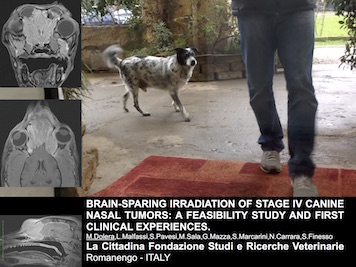BRAIN-SPARING IRRADIATION OF STAGE IV CANINE NASAL TUMORS: A FEASIBILITY STUDY AND FIRST CLINICAL EXPERIENCES
The prognosis for canine nasal tumours with intracranial extension is poor with an expected survival of 1 month with palliation and 6.7 months with irradiation. However, studies regarding stage IV nasal tumours treated with brain-sparing irradiation techniques are lacking. The aim of this prospective study was to evaluate feasibility and efficacy of definitive intent stereotactic radiotherapy in dogs with nasal tumours with massive intracranial extension. Seven dogs with stage IV nasal tumours were treated with high-dose hypo-fractionated stereotactic radiotherapy with VMAT technique. Dose prescriptions were 32-36 Gy in four consecutive-day fractions to the gross tumour and 30 Gy to limphatics. Adjuvant treatment included carboplatin. Serial clinical and CT/MRI examination were performed. Disease control and toxicity effects were evaluated according to RECIST and VRTOG criteria. Median survival time (MST) was evaluated using Kaplan-Meier curves. Six carcinoma and 1 sarcoma were treated. Prescription goals were obtained in four cases with V95%>95% and V107%>2% whereas in 3 dogs V95%=86-90% was accepted to limit maximum brain punctual dose <27 Gy. Two partial response and 5 complete responses were obtained. MST was 9 months. One grade II late brain radiotoxicity and two brain ascending infections were observed. Relapse pathways involves diffuse meningeal and sphenoid invasion. The initial experiences with the RT regimen adopted indicate a feasibility and effectiveness in modified stage IV nasal tumours. The relapse pathways observed suggest to evaluate alternative adjuvant treatment in dogs treated with stereotactic radiotherapy.
